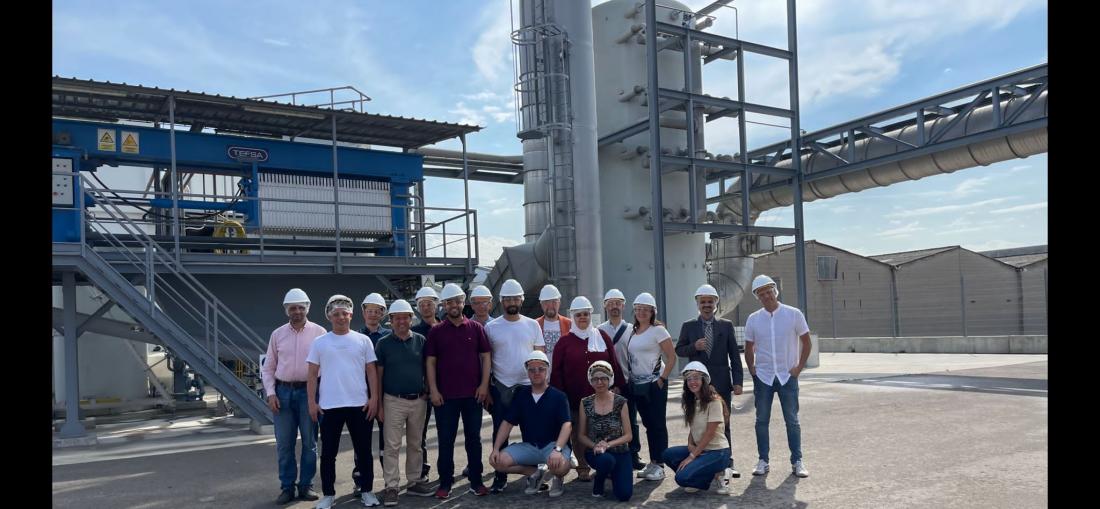NEX-LABS second fact finding mission in Barcelona laid the foundation to boost cooperation among Mediterranean innovators in Water, Energy and Food

The second NEX-LABS project fact-finding mission organized from 3rd to 7th July in Barcelona brought together 12 Mediterranean promising innovators selected through an open call.
The innovators coming from Greece, Palestine, Egypt, Algeria, Tunisia and Jordan met with companies, researchers, and research centers to discuss innovation in water, energy, and food. The itinerary was carefully planned by Universidad Autònoma of Barcelona (UAB).
The pursuit of environmental sustainability and research in Barcelona has attracted global attention due to the city's commitment to understanding and addressing environmental challenges. As part of a fact-finding mission, a delegation from diverse academic backgrounds gathered to explore various research institutes and organizations dedicated to environmental and sustainability studies.
During the kickoff meeting the participants presented their business ideas/research projects to the group to start the initial exchange of ideas.
The morning of day 1 continued with a meeting at Parc de Recerca UAB – Environmental & Sustainability (PRUAB) and Center for Research in Agricultural Genomics institute (CRAG) where participants could hear interesting use cases such as Planet Biotech, a biotech spin off of CRAG that helps crops to beat climate change and resist to drought.

Participants engaged in insightful discussions and witnessed groundbreaking research initiatives aimed at protecting the environment and promoting sustainable practices and were exposed to cutting-edge research in agricultural genomics, exploring ways to enhance food production while minimizing environmental impact.
The day continued with a visit to ICTA-Institute of Environmental Science and Technology (ICTA-UAB). During the meeting the different projects related to sustainability that they have in the center were presented and participants had the chance to visit ICTA offices which are built in a very sustainable way.

On the second day the delegation met the Urban Ecology Agency of Barcelona. Participants gained valuable insights into Barcelona's approach to urban ecology and sustainable city planning.

Following this, the Universidad Politécnica de Cataluña (UPC) showcased its revolutionary contributions to sustainable environmental chemistry and green energy.

In the afternoon the delegation engaged in an online session with the PRIMA Foundation at UAB. This session allowed participants to explore the role of PRIMA in supporting environmental and sustainability research and could request information on how to access funding opportunities.
The third day saw the delegation travel to Girona. The day began with an introduction to the Catalan Water Partnership (CWP) and the Catalan Institute for Water Research (ICRA). This session highlighted innovative approaches to water research and management, witnessing firsthand the facilities and technologies employed to address water-related challenges in Catalonia.


Then the delegation visited the Laboratory of Chemical and Environmental Engineering (LEQUIA) where they could learn about groundbreaking studies in chemical engineering and environmental sustainability.

On the fourth day, the innovators met Aeris Tecnologías Ambientales and Ercros company. Aeris showcased the innovation in environmental technologies aimed at combating pollution and improving air quality that they implemented in the Ercros facility.

Next, the delegation visited the ALBA synchrotron; a 3rd generation Synchrotron Light facility located in Cerdanyola del Vallès, (Barcelona), being the newest source in the Mediterranean area, which allows the visualization of the atomic structure of matter as well as the study of its properties.

Then the delegates moved to the Department of Animal and Food Science. This department's research focused on sustainable agricultural practices and the impact of food systems on the environment.
The final day was dedicated to a meeting with the Centro Tecnológico en Biodiversidad, Ecología, Tecnología Ambiental y Alimentaria (BETA - VIC). Participants were impressed by BETA's multidisciplinary approach to environmental technology and biodiversity conservation.

The five-day fact-finding mission provided overall an exceptional opportunity for the participants to witness Catalunyan innovative contributions to environmental and sustainability research. With a renewed commitment to collaboration and knowledge exchange, the delegates returned to their respective institutions, inspired to contribute to a more sustainable future.










